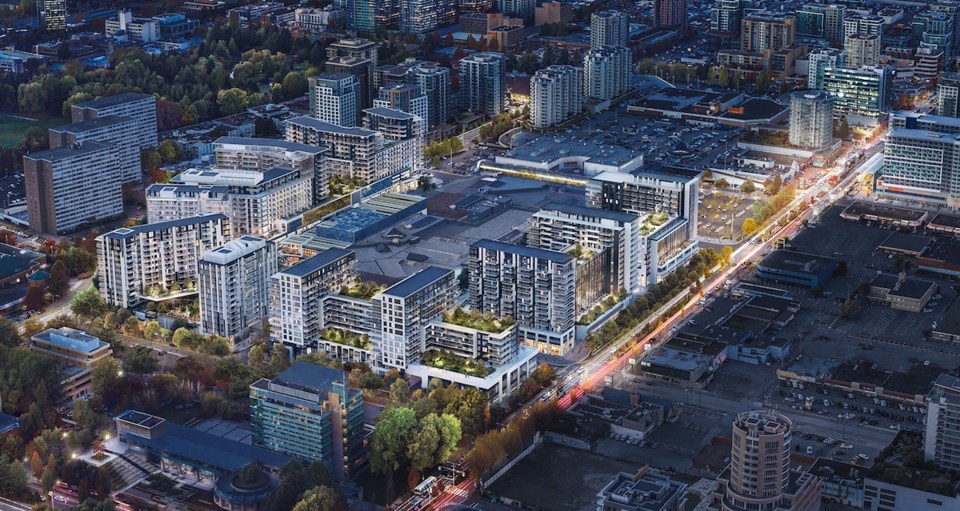Rising construction costs could put the brakes on new development in the coming months, but some builders are finding creative ways to keep projects moving forward.
“I would be shocked if we don’t see a few projects that either get capped, delayed, etc. over the next year or so because there’s just too much upward pressure on costs,” Matthew Cavanagh, vice-president, development with Cadillac Fairview told members of commercial real estate association NAIOP on June 16.
Cavanagh was part of a panel discussing the impact of construction cost increases and supply chain disruptions on B.C. developers.
The issues are impacting planning for the next phase of Cadillac Fairview’s redevelopment of Richmond Centre, undertaken in partnership with Shape Properties Corp.
Approximately 1,000 homes are being built in six towers as part of the initial phase of the 27-acre project, now under construction. When the impacts of the pandemic on supply chains became clear in late 2020, the project management team went on the defensive and began securing supplies.
“They saw this coming and they really got ahead of it,” Cavanagh said. “We locked in about 80% of our risk. … We are still very much above water on our proforma.”
But the next phase, with an additional 1,200 units, will be more complicated. Construction costs continue to rise, prompting Cadillac Fairview to consider ways to design with cost increases in mind.
“How can we design this in a way that’s going to be resilient to cost and risk increases?” he said. “We’re trying to find a way to design this and get it ready in a procedure that doesn’t get us into a position where we design this beautiful building we love and people want to buy into it but just can’t afford it.”
Cavanagh said Cadillac Fairview’s revenues have kept up with construction cost increases to date, but he doesn’t expect that to be the case for much longer.
“The only thing keeping us alive right now has been revenue increases,” he said. “We have seen the cost of presales go up but that can only go up so far, and we’ve hit an inflection point where we are at a place where we cannot rely on revenues covering our butts anymore.”
Cavanagh’s comments echoed those of Michael Ferreira, principal of Zonda Urban (formerly Urban Analytics), who told the Urban Development Institute at the end of May that construction costs were pushing up presale prices.
Towers are launching in Metrotown at $1,300 a square foot while pricing in Burquitlam is topping $1,100 a square foot.
“This is what you need to get in order to make the project viable based on construction costs, uncertainty and some of the other factors,” Ferreira said. “It will be interesting as we move forward to see whether or not these prices are achievable.”
Rising costs and the question of how to pay for them is impacting Kindred Construction, which won’t be starting any new residential towers this summer.
“The market-driven condo landscape right now is challenging,” Kindred president Bryan Reid told NAIOP. “They’re all delayed. Nobody’s pushed ‘go’ on a project that was supposed to start for us this summer or fall.”
Worse, the uncertainties make it tough to know which ones will actually proceed.
“A very significant point of analysis now is, is the project viable, will it be built, when will it be built?” Reid said. “For us to rely on a developer that’s got a concrete condo project at 12 storeys [being] a viable project in this landscape is challenging.”
To give stakeholders certainty, EllisDon Corp. is incorporating design-build principles in traditional procurement models. This allows it to lock in costs earlier, keeping projects on track while hedging against cost increases.
“If you know you’re going, it allows you to make decisions earlier,” said Craig Enns, vice-president and area manager with EllisDon. “It mitigates immensely a lot of the escalation you’re seeing through the design stage.”
One project EllisDon is handling right now requires mass timber. Working with its subtrades, EllisDon has developed a contract indexed to the price of fibre. The order will be in line but won’t proceed until fibre prices are right.
“We’re not going to put mass timber in the building for another 18 months,” Enns said. “We’re in line, and we’ve hedged against escalation.”
Fellow panellist Byron Chard, president and CEO of Chard Development Ltd., said lenders are stepping up to accommodate the shifts. Supplies can now be stored with subtrades rather than the general contractor or the developer, for example, something not permitted in the past.
“They’re here to get projects complete, find the room for that prepurchasing,” he said. “They’re coming to the table [with an attitude] of how they can help with the supply chain.”


